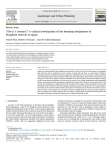Paül V., Vila-Lage R., Trillo-Santamaria J.-M. (2022). “The n°1 country”? A critical investigation of the booming designation of biosphere reserves in Spain. Landscape and Urban Planning, 01/06/2022, vol. 222, p. 1-10.
https://doi.org/10.1016/j.landurbplan.2022.104375
https://doi.org/10.1016/j.landurbplan.2022.104375
| Titre : | “The n°1 country”? A critical investigation of the booming designation of biosphere reserves in Spain (2022) |
| Auteurs : | V. Paül ; R. Vila-Lage ; J.-M. Trillo-Santamaria |
| Type de document : | Article |
| Dans : | Landscape and Urban Planning (vol. 222, June 2022) |
| Article en page(s) : | p. 1-10 |
| Langues : | Anglais |
| Langues du résumé : | Anglais |
| Catégories : |
Catégories principales 07 - ENVIRONNEMENT ; 7.4 - Ressources Naturelles : Paysage, Biodiversité, Patrimoine naturelThésaurus IAMM BIOSPHERE ; ZONE PROTEGEE ; DEVELOPPEMENT DURABLE ; BIODIVERSITE ; CONCEPT ; ESPAGNE |
| Résumé : | Spain is the country with the most biosphere reserves (BRs) in the world. The aim of this paper is to investigate why BRs have come to proliferate to such a degree in Spain and why there is a gap between UNESCO’s framework and the practicalities observed in Spain. After outlining how a BR is conceived according to UNESCO and reviewing the large volume of research published to date in this respect, Spain’s BRs are characterised. The study here is based on an empirical research undertaken in five BRs located in north-western Spain by making use of 60 semi-structured interviews. The results are the outcome of the coding, categorization and interpretation of these conversations with the interviewees, obtaining three large semiotic clusters: the perceptions held of the BR tool; the development or application of the BR concept; and the reasons for their designation. Two specific underlying motives are detected for the prodigious momentum acquired by Spain’s BRs: one is geopolitical, in the context of the constant conflicts between the Spanish Government and the devolved autonomous communities; the other is the prominent role conceded to tourism in justifying the BRs. Hence, the paper reveals how BRs are political and economic products that have little in common with the theoretical environmental and sustainable development dimensions described in the UNESCO framework on BRs. |
| Cote : | En ligne |
| URL / DOI : | https://doi.org/10.1016/j.landurbplan.2022.104375 |







